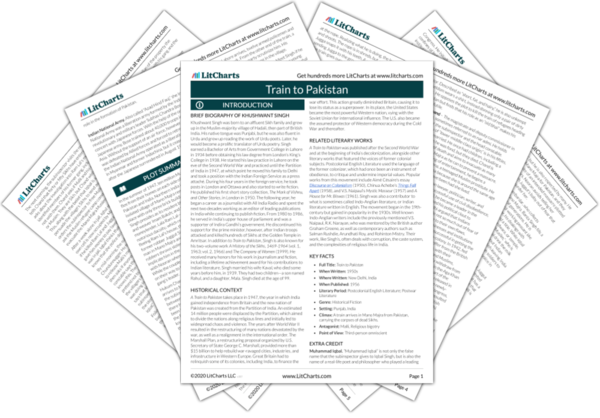Imam Baksh Quotes in Train to Pakistan
Independence meant little or nothing to these people. They did not even realize that it was a step forward and that all they needed to do was to take the next step and turn the make-believe political freedom into a real economic one.

Unlock explanations and citation info for this and every other Train to Pakistan quote.
Plus so much more...
Get LitCharts A+“They are a race of four-twenties,” he said vehemently. [Section 420 of the Indian Penal Code defines the offense of cheating.] “Do not believe what they say.” Once again he felt his venom had missed its mark. But the Big Lord’s daughter sitting cross-legged with her eyes shut for the benefit of press photographers, and the Big Lord himself—the handsome, Hindustani-speaking cousin of the King, who loved India like the missionaries—was always too much for Iqbal …. “They would not have spread their domain all over the world if they had been honest. That, however, is irrelevant,” added Iqbal. It was time to change the subject. “What is important is: what is going to happen now?”
What could he—one little man—do in this enormous impersonal land of four hundred million? Could he stop the killing? Obviously not. Everyone—Hindu, Muslim, Sikh, Congressite, Leaguer, Akali, or Communist—was deep in it. It was fatuous to suggest that the bourgeois revolution could be turned into a proletarian one. The stage had not arrived. The proletariat was indifferent to political freedom for Hindustan or Pakistan, except when it could be given political significance like grabbing land by killing an owner who was of a different religious denomination. All that could be done was to divert the kill-and-grab instinct from communal channels and turn it against the propertied class. That was the proletarian revolution the easy way. His party bosses would not see it.
The northern horizon, which had turned a bluish gray, showed orange again. The orange turned into copper and then into a luminous russet. Red tongues of flame leaped into the black sky. A soft breeze began to blow toward the village. It brought the smell of burning kerosene, then of wood. And then—a faint acrid smell of searing flesh. The village was stilled in a deathly silence. No one asked anyone else what the odor was. They all knew. They had known it all the time. The answer was implicit in the fact that the train had come from Pakistan.

Imam Baksh Quotes in Train to Pakistan
Independence meant little or nothing to these people. They did not even realize that it was a step forward and that all they needed to do was to take the next step and turn the make-believe political freedom into a real economic one.

Unlock explanations and citation info for this and every other Train to Pakistan quote.
Plus so much more...
Get LitCharts A+“They are a race of four-twenties,” he said vehemently. [Section 420 of the Indian Penal Code defines the offense of cheating.] “Do not believe what they say.” Once again he felt his venom had missed its mark. But the Big Lord’s daughter sitting cross-legged with her eyes shut for the benefit of press photographers, and the Big Lord himself—the handsome, Hindustani-speaking cousin of the King, who loved India like the missionaries—was always too much for Iqbal …. “They would not have spread their domain all over the world if they had been honest. That, however, is irrelevant,” added Iqbal. It was time to change the subject. “What is important is: what is going to happen now?”
What could he—one little man—do in this enormous impersonal land of four hundred million? Could he stop the killing? Obviously not. Everyone—Hindu, Muslim, Sikh, Congressite, Leaguer, Akali, or Communist—was deep in it. It was fatuous to suggest that the bourgeois revolution could be turned into a proletarian one. The stage had not arrived. The proletariat was indifferent to political freedom for Hindustan or Pakistan, except when it could be given political significance like grabbing land by killing an owner who was of a different religious denomination. All that could be done was to divert the kill-and-grab instinct from communal channels and turn it against the propertied class. That was the proletarian revolution the easy way. His party bosses would not see it.
The northern horizon, which had turned a bluish gray, showed orange again. The orange turned into copper and then into a luminous russet. Red tongues of flame leaped into the black sky. A soft breeze began to blow toward the village. It brought the smell of burning kerosene, then of wood. And then—a faint acrid smell of searing flesh. The village was stilled in a deathly silence. No one asked anyone else what the odor was. They all knew. They had known it all the time. The answer was implicit in the fact that the train had come from Pakistan.











